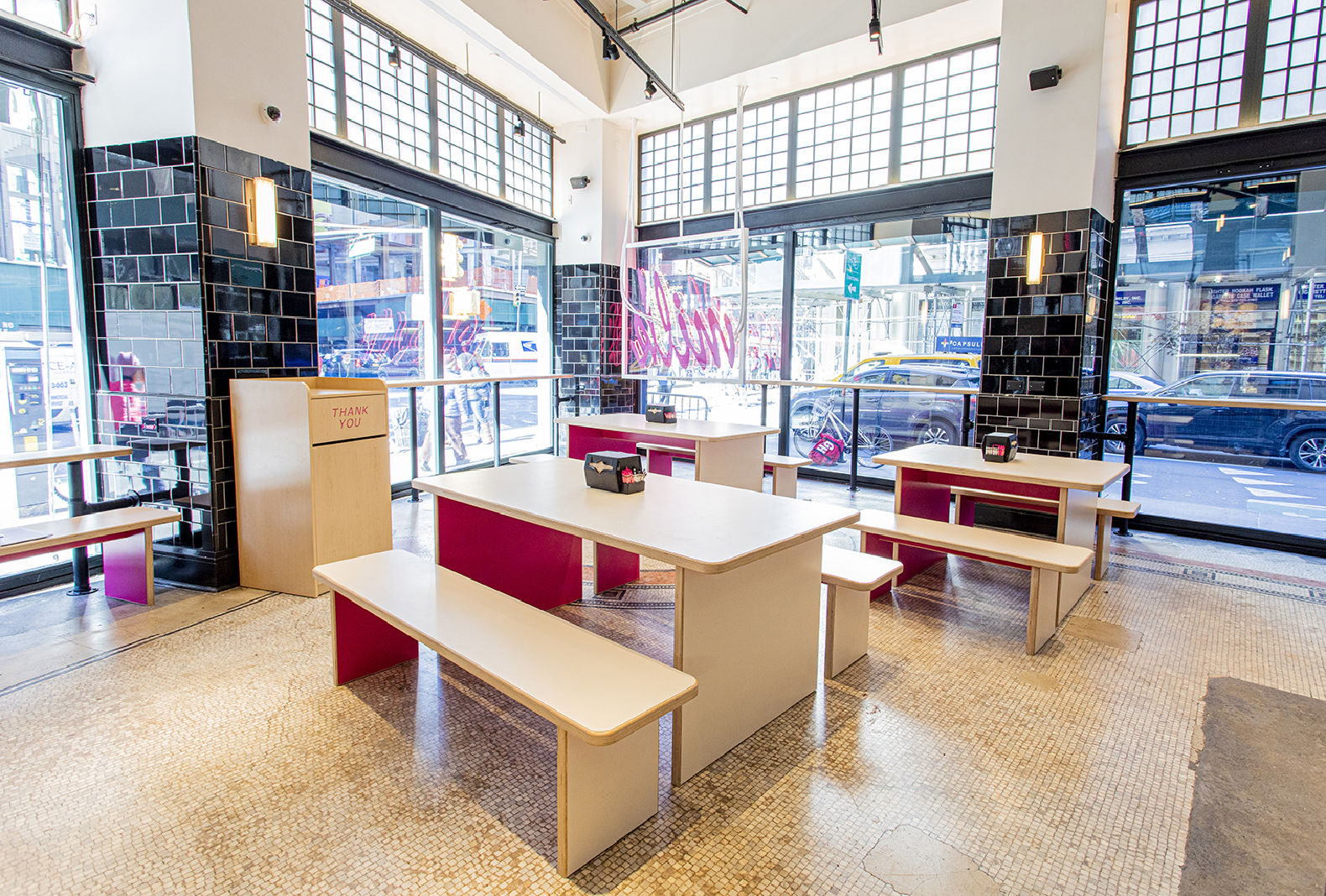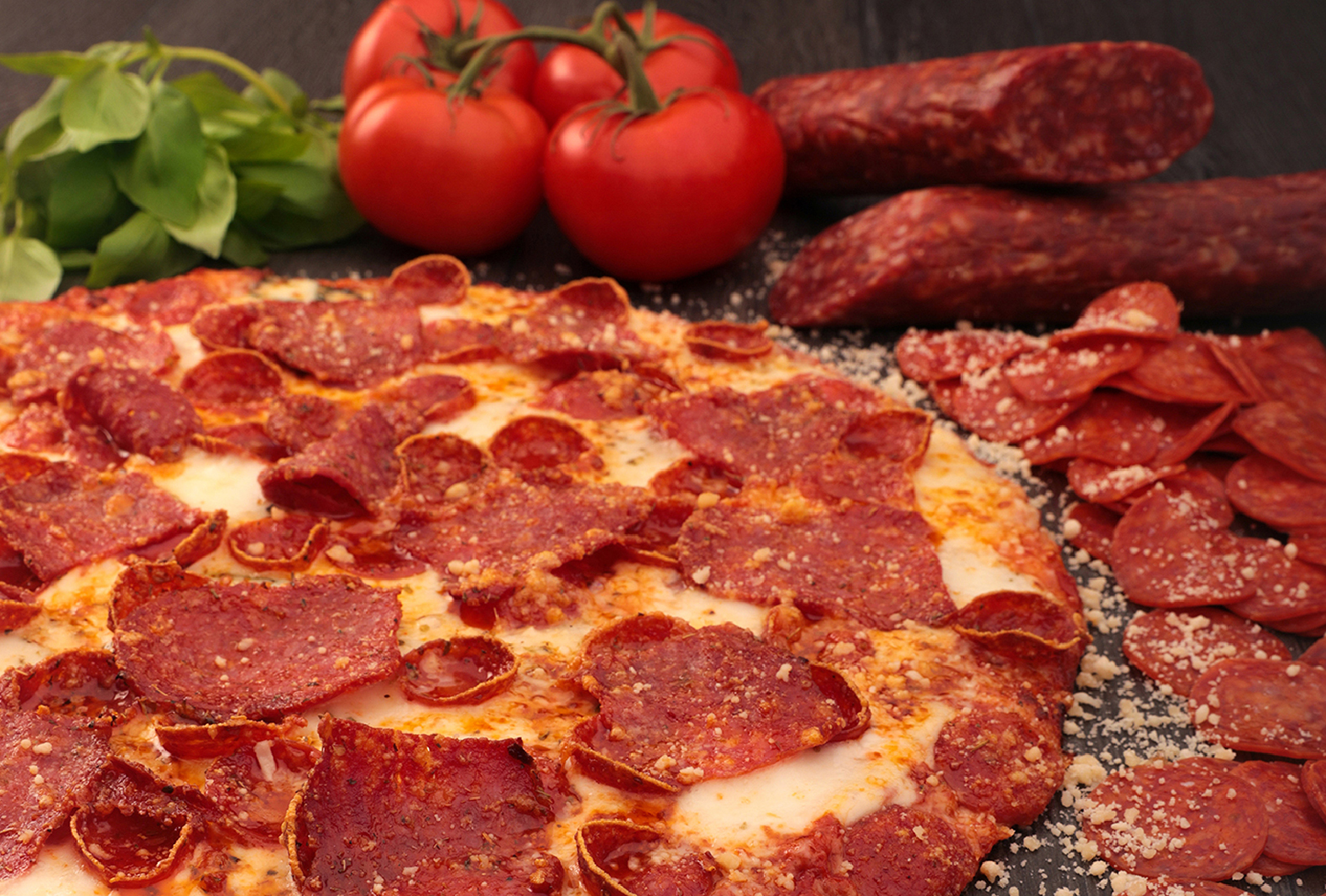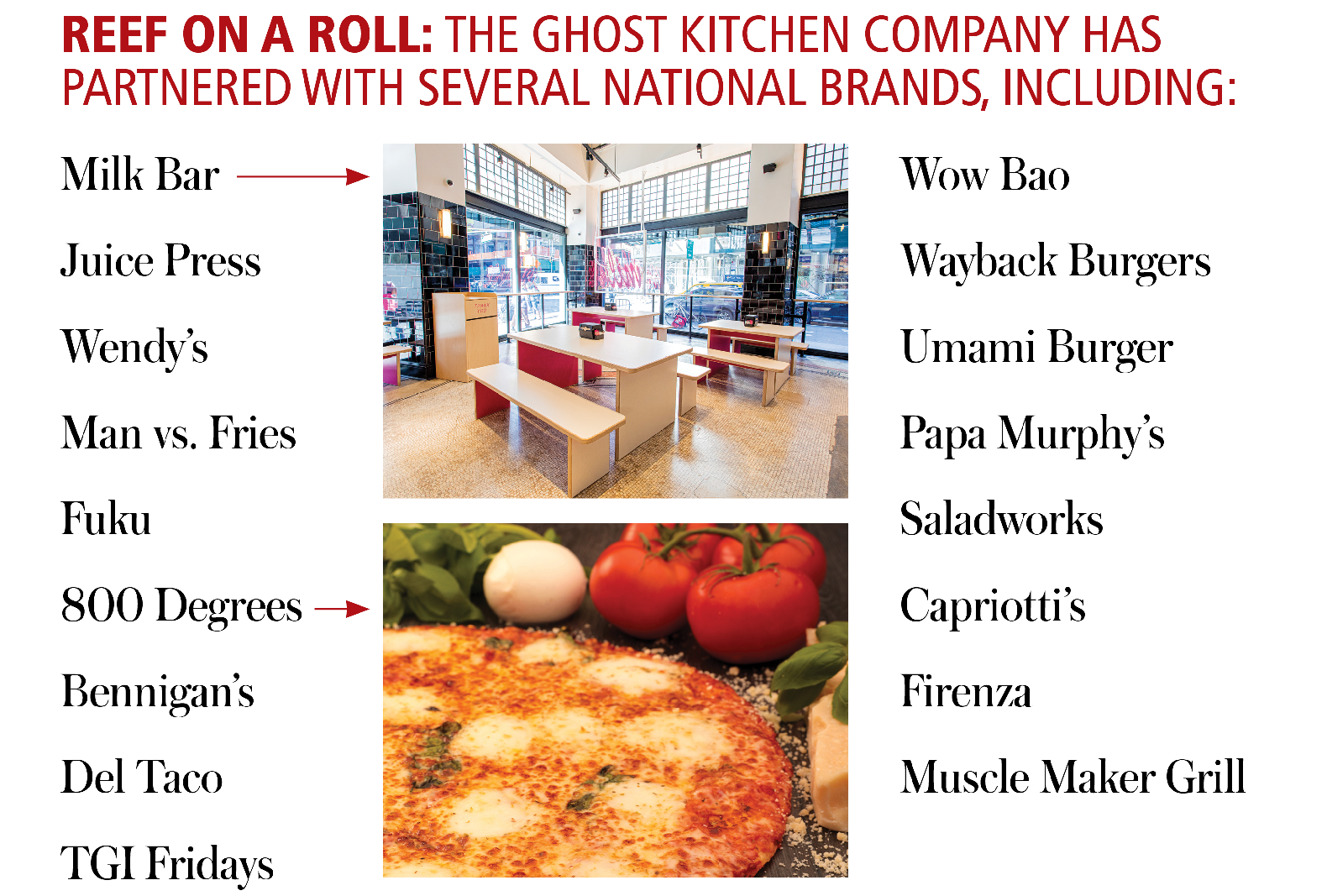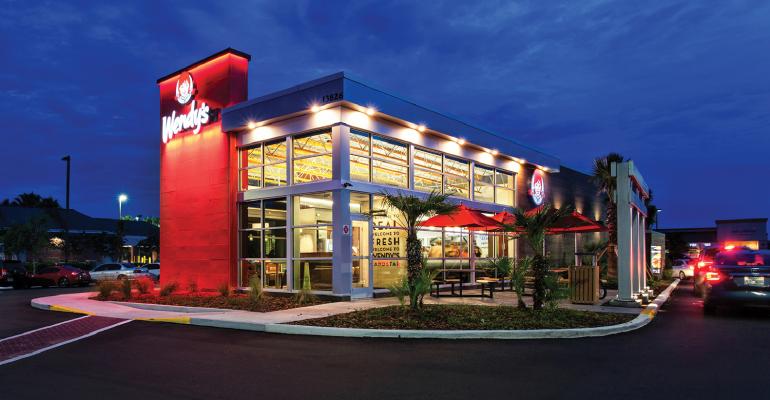In 2019, Reef Technology — formerly known as ParkJockey — was a parking facilities company offering a digital solution to paper tickets for parking customers across 5,000 lots and garages in North America. Two years later, Reef has become one of the most recognized names in ghost kitchen technology.
Since Reef launched its virtual restaurant arm, Reef Kitchens, at the end of 2019, ghost kitchens have evolved from a technological curiosity to a restaurant industry mainstay and a cheaper way to create and expand brands without the financial ties of a brick-and-mortar presence.
Although there are multiple virtual restaurant companies contributing to the massive growth of delivery-only restaurants, Reef has become one of the top names in the industry, using its expansive network of parking lots and garages to rapidly expand a fleet of 5,000-plus ghost kitchen “vessels” in the nooks and crannies of major cities.

Reef started working with Milk Bar in August.
In the last quarter alone, Reef has announced partnerships with six restaurant brands: Milk Bar and Wendy’s in August, 800 Degrees fast-casual pizza chain and Bennigan’s in September, and Del Taco and TGI Fridays in October.
With the Wendy’s partnership, Reef will be helping to open as many as 700 delivery-only restaurants over the next five years in the U.S., Canada and the U.K., with 50 virtual restaurants to open before the year’s end, as Wendy’s CEO Todd Penegor told investors in August that the quick-service chain is “still very early in the nontraditional development journey.”
800 Degrees, meanwhile, is using a new Reef-powered ghost kitchen network and automated build-your-pizza kiosks from Piestro to stretch its reach to 500 delivery locations. Since it’s harder to replicate wood-fired Neapolitan pizzas en masse virtually, crust and classic pizzas will be available via the ghost kitchen restaurants and robotic kiosks, while 800 Degrees brick-and-mortar restaurants will stick to its pizzas made via wood-fired ovens.
 More recently, Reef’s partnership with TGI Fridays marks the first global casual-dining brand in the technology company’s growing portfolio. The casual dining chain is prepared to launch 300 virtual restaurants internationally over the next five years — nearly half of its existing 700-restaurant portfolio. Roy Blanchette, CEO of TGI Fridays, described Reef as a “launching pad” for spreading the Fridays brand to underserved markets.
More recently, Reef’s partnership with TGI Fridays marks the first global casual-dining brand in the technology company’s growing portfolio. The casual dining chain is prepared to launch 300 virtual restaurants internationally over the next five years — nearly half of its existing 700-restaurant portfolio. Roy Blanchette, CEO of TGI Fridays, described Reef as a “launching pad” for spreading the Fridays brand to underserved markets.
But with thousands of virtual restaurants slated to open under the Reef umbrella over the next several years, the question remains: How is it growing so fast?
“We don't see ourselves as disruptors,” Alan Philips, chief creative officer with Reef, told Nation’s Restaurant News. “When we partner with brands, we are helping that brand do what they do in the best way possible in this new world. … We've built a network of hundreds of ghost kitchens and hundreds of retail locations. I don't know of anyone who's going to be able to take brands and bring them onto the platform and expand them in such a capital efficient and neighborhood centric way.”
One of the reasons Reef is growing so quickly is its ability to operate in unorthodox locations. Whereas many virtual restaurants operate solely out of commissary kitchens or the back of pre-existing brick-and-mortar locations, Reef’s vessels are large kitchen trailers the size of shipping containers that are not bound by real estate limits. They’re a hybrid of food trucks/carts and traditional restaurant operations models.

This unique model isn’t without its complications. Reef was recently flagged by the New York City Health Department while operating within the murky area between restaurant and food truck/cart. Insider recently reported that Reef Technology has temporarily voluntarily suspended all operations of its vessel kitchens. The company had been operating its kitchens — for which there is no health permit type in New York City — under temporary food truck permits while in the process of obtaining long-term health permits for its modular kitchens. Reef’s brick-and-mortar locations are still in operation in New York City.
“Reef Kitchens is operating in compliance with New York City regulations from fully-permitted brick-and-mortar locations,” a Reef spokesperson told Nation’s Restaurant News. “We continue to work collaboratively with regulators on ways to permit our innovative model, which seeks to reinvent urban spaces in a way that improves cities and neighborhoods with modular structures.”
Although Reef has claimed that the company ceased operations of its modular kitchens before any reprimand from the New York City Health Department, Insider obtained a statement from the Department of Health that suggests otherwise.
"The Health Department determined that multiple establishments operating under DBA (Doing Business As) 'Reef Neighborhood Kitchen' were violating numerous New York City health and safety requirements,” the New York City Health Department said in a statement, adding that the company has “agreed to cease operations” to ensure that it is in compliance with city regulations. The Health Department did not respond by press time to request for comment.
There is only one location of Reef Kitchen listed on the New York City Health Department restaurant inspections ratings. Umami Burger, operated under Reef Kitchen, is listed as “not yet graded” but has multiple violations under New York City health rules and regulations, including “food from an unapproved source” and “inadequate personal cleanliness.”
“Reef is very proud of its record of serving safe food in a clean environment,” the company said in a statement. “If you look at the total score of violations Reef has received, we are a negligible fraction compared to most major restaurant operators in New York. Our commitment to high standards is abundantly clear.”

Navigating local health department regulations is not a new operating challenge for Reef. The virtual restaurant company typically works with city regulators to figure out how to work around traditional permit and licensing regulations, which don’t take into account its unique operating structure. In fact, Reef has said that other cities like Miami have already begun working on new regulations to make room for ghost kitchen vessels and mobile kitchens. In New York City (along with other markets), it was easier for the ghost kitchen company to enter the market using temporary vendor licenses (which often have fewer regulations than long-term licenses).
Reef expects that permits for its temporarily shuttered kitchen vessels will be approved and that the shuttered locations will be back up and running by the end of the year, pending any COVID-19 related delays.
Despite these growing pains, Reef’s army of kitchen commissaries and mobile kitchens continues to expand rapidly. Calling its portfolio “an ecosystem of diversity” with room for diverse types of foodservice brands, Philips believes that Reef has only just begun.
“I see our platform as a way for restaurateurs and brands to be as creative as possible,” he said. “We’re just enablers to help make those dreams come true. … We can scale physical businesses like digital businesses — like taking a brand from one location to 100 locations in less than a year. This is unheard of in the world of hospitality.”
So, what’s next? Although Philips would not divulge forthcoming partnerships, he sees independent restaurants as just as crucial to the future Reef ecosystem as larger chain restaurants with goals of 500-plus virtual locations. But as the concept of virtual restaurants continues to evolve, the definition of a virtual restaurant brand might change.
“In the future, let’s say you’re sitting and watching a Netflix show and you see John Favreau and Roy Choi making a pizza on-screen, and you click on your screen and then that pizza is delivered to you in 30 minutes or less from the Reef platform,” he said. “As the market saturation becomes deeper, these capabilities are going to become real and the marriage between the digital and physical restaurant world will be extraordinary.”
Contact Joanna Fantozzi at [email protected]
Follow her on Twitter: @JoannaFantozzi





